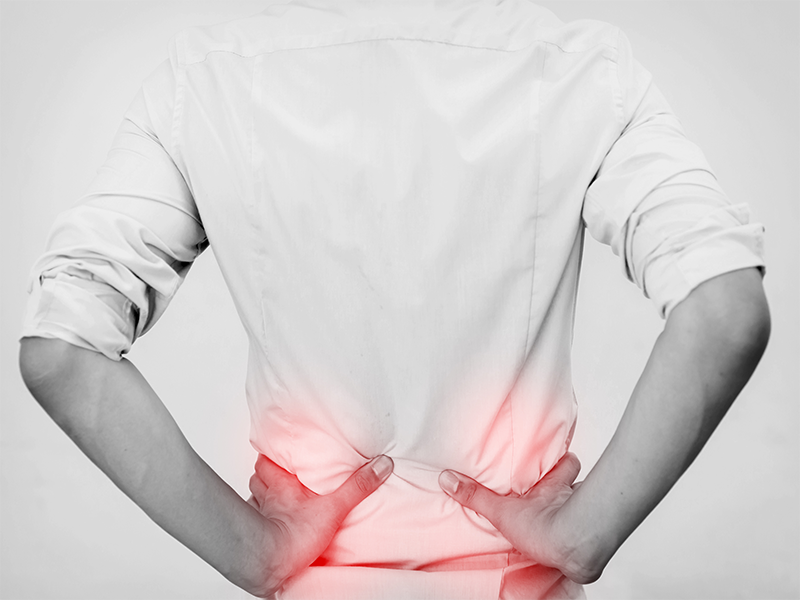Degenerative Disc Disease (or DDD) occurs when usual changes taking place in the intervertebral discs of spine result in pain. Regardless of its name, it is neither considered a disease and nor is it progressively degenerative. The spinal discs act like shock absorbers between the vertebrae or bones of your spine. They help in keeping the back flexible, allowing it to bend and twist.
Aging, micro/macro trauma, and minor injuries often results in the disc degeneration, causing spinal discs to eventually lose water as the weakening of annulus fibrosus or rigid outer shell of disc takes place. These discs start breaking down and may not function properly as they weaken and lose water. This could lay pressure on the nerves in the spinal column and cause pain and weakness.
Almost everyone experiences breakdown of discs over time but not everyone has the pain. It can considerably affect the quality of life. Degenerative disc disease isn’t a problem of most of the people but can cause severe chronic pain in some individuals when left untreated.
Here are the causes, symptoms, diagnosis and treatment of DDD.
What Are The Causes Of Degenerative Disc Disease?

The spinal discs are made of a tough inner wall and soft inner core. The changes in discs that may be causes of DDD are:
Crack: The daily stresses of regular movements and minor injuries over time can cause tiny wear and tear in the outer walls containing nerves. The tears near the nerves can feel painful. And if the wall ends up breaking down, the softcore of the disc may push through cracks. The disc may swell up or slip out of place (called herniated or slipped disc). It can even affect surrounding nerves.
Dry out: At the time of birth, the discs in your spine are composed of mostly water. As you get older, the discs lose water and become thinner. The flatter discs cannot absorb shocks also. The loss of water also suggests less padding or cushion between your vertebrae. This can cause other problems in your spine and lead to pain.
What Are The Signs & Symptoms?

You will likely experience a sharp or constant pain in your neck or back. The symptoms vary according to the location of weak disc and other changes caused.
The common signs and symptoms include a pain that:
-
Occurs in lower back, upper thighs or buttocks
-
Is severe or nagging and comes and goes. It can last from a few days to a few months.
-
Worsens when you sit and gets better when you move or walk
-
Aggravates when you bend, lift or twist
-
Gets better as you change positions or lie down
In certain cases, DDD can cause numbness and tingling in arms and legs. It can also weaken your leg muscles. This could mean that the damaged discs may be affecting the nerves surrounding your spine.
How Is DDD Diagnosed?

For diagnosis of DDD, the doctor will enquire about your medical history and symptoms. The common questions a doctor may ask to confirm this condition are:
-
When did the pain start?
-
Where in the spine are you feeling the pain?
-
Has the pain spread to other body parts?
-
Have you had any spine injuries in the past?
-
Do you have a family history of similar problems.
The doctor would look for the signs of this condition, like lower back pain (lumbago) or neck pain. You may also be asked to walk or bend in order to find out which movements are causing pain.
An X-ray or MRI may be recommended for checking if there’s any bone or nerve damage near your spine.
How To Treat It?

In this condition, the treatment aims to relieve pain and prevent further damage. Depending on the symptoms and severity of condition, the treatment or plan is made by the doctor.
The treatments include:
*Physical therapy: Certain movements add flexibility and strength to the muscles in your neck and back which supports the spine. In most of the cases, physical therapy and pain medication are sufficient to provide long-term relief.
*Medication: Over-the-counter pain relievers such as aspirin and ibuprofen help in fighting inflammation. They help in easing your pain and lessening the swelling. Your doctor may even prescribe a heavier drug for pain if needed. Degenerative disc disease may also cause muscle spasms and your doctor may suggest medicine for relieving them.
*Steroid shots: These are strong medications that help in easing pain, swelling and inflammation. Your doctor may even suggest you to get a shot in the epidural space of your back (fluid-filled area surrounding the spine) or in your nerve or muscle.
*Surgery: If any of these treatments are not effective, your doctor may recommend surgery. A procedure known as discectomy removes the affected part of the disc. This helps in taking the pressure off your nerves. And in some cases, your doctor may even remove the whole disc and replace it by an artificial one. In a severe case, your doctor might fuse (permanently connect) the bones in your spinal after disc removal.
Image Source:
1) dssmd
2) wp
3) sincron
4) medicalnewstoday

